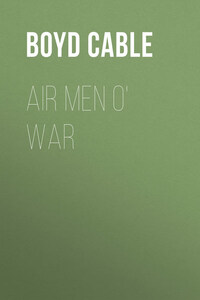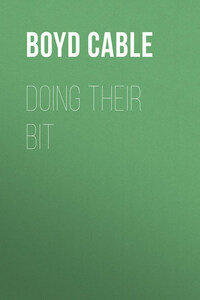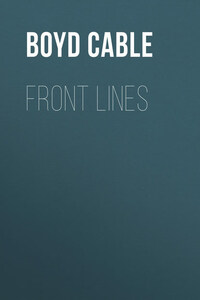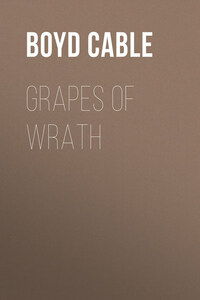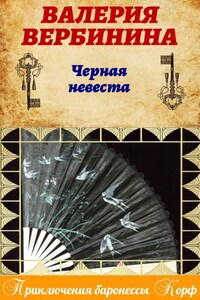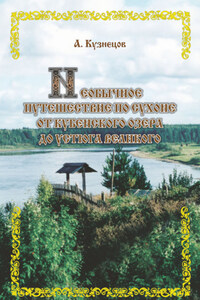It was fiercely hot inside the hut, although the click and snap of the tin roof spoke of its cooling now that the sun was off it. The men eating their supper at the long deal table sat with shirt sleeves rolled up and collars open at the throat, and the sweat drops glistening on their browned faces, brick-red arms, and lean throats. In spite of the heat they ate hugely, as men do who have spent a long day in the saddle, and “Blazes,” the cook, was kept busy replenishing the heaped-up plates.
As they finished, one by one the men pushed their plates back and loaded their pipes, and the reek of strong tobacco mingled with the smells of cooked meats and the kerosene lamp on the wall.
“Scottie” Mackellar, slow and deliberate in eating as in most things, was the last to finish and light his pipe.
He had been down to the station that day, just returning as supper was served, and although the men waited expectantly for news or orders, they waited without questions, knowing Scottie and his ways, and that questions were more likely to delay than hasten his words.
“Whip” Thompson tried gently for a rise.
“What’s it looking like below, Mac?” he asked.
“Dry,” said Scottie, slowly, “vera dry.” As they had all been thinking and talking of little else but the dry spell that had lain hot and heavy on the land for months past, this did not convey much fresh information.
“How d’you think the sheep are makin’ out?” tried Whip Thompson again.
“They micht be better,” said Scottie. “But then again, they micht be worse.”
“Wot’s the boss sayin’ about it?” asked another man.
“What would he be saying?” countered Scottie.
“If I was ’im,” struck in Jack Ever, a little man with a peaky face, “I’d be sayin’ something in sulphur-coloured langwidge wi’ purple trimmin’s.”
Scottie made no reply, and the men began to drift slowly out of doors to lounge and smoke, or perch themselves on the rail in front of the hut.
“’E’s a bloomin’ hencyclopeedy, ain’t ’e?” said Ever, disgustedly, when he had settled himself comfortably.
“You’d have got more if you’d asked less,” said Aleck Gault, with a light laugh.
A lumbering man, with a heavy jowl and a thick neck, sprawled his arms on the top rail of the fence and laughed hoarsely.
“It’s ver-r-ra dry,” he mimicked. “Never a spit or a spot o’ rain for this month o’ Sundays; the sheep eatin’ the skin off’n the country, an’ the seeds below the skin; the paddocks bare as the back of yer hand an’ even the hills gettin’ eaten out, an’ the cattle wi’ as much flesh on ’em as a post an’ rail fence; the sheep droppin’ dead in droves like flies in a frost, an’ good for nothin’ ’cept to fatten the crows; the bottoms o’ the tanks dry mud this month back, an’ the river mostly dry sand. An’ I believe ye, Scottie – it’s dry, ver-r-ra dry.”
“Here’s Scottie comin’ now, Darby,” said Whip Thompson. “Wot’s he goin’ to do wi’ the broom?”
“If you never want to know – just ask him,” grunted Darby.
Scottie approached with the broom under his arm. “I’ll be wantin’ three o’ ye to go down to the station to-morrow,” he said. “You, Aleck, an’ Ned an’ Jack.”
“Wot to do?” said Jack Ever.
“The boss’ll tell ye that,” said Scottie. “He was speakin’ o’ shiftin’ the sheep out again tae the back paddocks an’ mebbe up into the hills.”
Whip Thompson whistled. “Goin’ to be some graft presently,” he said. “Handlin’ silly bleatin’ jumbucks over the Pinnacles country an’ through the Whistlin’ Hills’ll be some sport.”
“You an’ Darby’ll stop an’ gie me a hand,” said Scottie. “I’ll be puttin’ the little hut in some sort o’ shape. And, Steve Knight, ye micht tak’ a turn up by Split-the-Wind, and push back ony o’ the cattle beasties ye see intae the hills a bit.”
Steve Knight looked up from the stockwhip he was plaiting. “Stay out or get back at night?” he asked.
“Get back,” said Scottie, and moved slowly away.
The men watched him go to the old hut that stood a couple of hundred yards from the big one, untwist the bit of fencing wire that held the door, and pass in with his broom.
“Put the little hut in shape,” said Darby. “What d’you suppose…”
He interrupted himself. “An’ what’s wrong wi’ Blazes? He looks mad over suthin’.”
The cook had bounced from the door, dashed out a basin of greasy water, and flung himself inside again with violent anger and indignation in every motion, and then the men could hear him rattling and slamming dishes about as if they were his personal enemies.
They were all too well accustomed to the blazes of anger that had earned him his name to pay much attention to it, and just at present they were much more concerned over what Scottie was going to do with the small hut. But it appeared there was a connection between the two things.
“’As he tole you?” Blazes demanded, coming over to them. “’As he tole you ’e’s bringin’ them blighted sheep up ’ere?”
“Yes,” said Darby. “But I dunno why it should worry you, Blazes. You don’t ’ave to cook for the sheep.”
“Cook for the sheep, you mutton-’ead” retorted Blazes. “Don’t I ’ave to cook for the shepherds though? Don’t I know wot it means too? Men comin’ in all hours day an’ night, and wantin’ feedin’. An’ makin’ up tucker for you an’ the rest to take out on the ’ills. An’ extry ’ands ’ere from down below…”

